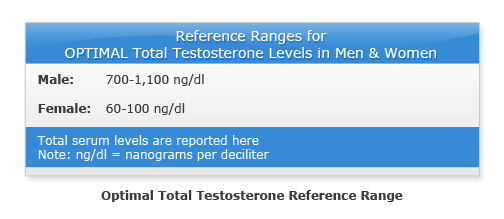
Testing for Low Testosterone Levels
A simple blood test is used for evaluating testosterone levels, and there are several ways measure it all of which at least include checking your bound (that which is attached to Sex Hormone Binding Globulin - SHBG) and 'free' (unbound or available) testosterone, FSH (follicle stimulating hormone) and LH (luteining hormone), and other breakout measures that are pulled together to yield a total. Typically testosterone deficiency is usually determined when the total serum level is below 350 ng/dl (nanograms per deciliter). An educated physician knows how to accurately and correctly diagnose for low testosterone. First listening to the patients symptoms and a proper health history is taken into account first and foremost; then labs correctly interpreted by a skillfull physician. The most important lab value is not the total testosterone level at all. It's the free testosterone is what's important here. Free testosterone is the unbound therefore "free" to circulate in the body building muscles, bones and giving us our mojo. Only makes since that this is the level to watch. Free testosterone only makes up 1-2% of total testosterone because the other 98% is bound up and occupied by proteins. Most men will start experiencing symptoms of declining testosterone when their free testosterone reaches 150 pg/dl or 15 pg/ml and symptoms intensify as levels continue to decline
Why Test?
One might undergo testosterone testing for two basic types of reasons: 1) it was medically recommended, i.e. a physician believes a certain condition may stem from low testosterone and; 2) personal reasons, e.g. you feel low testosterone is hindering your sexual intimacy or any of the symptoms of low testosterone exist. There are a variety of very specific reasons for measuring testosterone levels including to:
- Determine the need for TRT (testosterone replacement therapy)
- Monitor the progress of TRT
- Investigate sexual problems such as reduced sex drive and/or erectile dysfunction
- Determine if high levels of testosterone are causing precocious puberty in children (boys and girls) under 10 yrs of age
- Examine why a woman is developing male features, such as excessive body and facial hair (hirsutism), and/or a deeper voice
- Check on the effectiveness of testosterone-lowering medications taken to combat advanced prostate cancer
- Establish a baseline level for athletic and recreational use
- Address concerns of infertility and/or low sperm count
- Explore the possible cause of male osteoporosis
Preparation
There's really nothing specific for you to do, although your physician may want you to take a morning blood test. The blood sample should be drawn in the morning when testosterone levels are highest, and because daily bodily stress (work, exercise, medication, alcohol consumption etc.) can significantly influence levels.
Procedure
Testosterone testing is no different than any other time you've had blood taken. The nurse or CNA will:
- Tie a band around your upper arm to better access a good vein
- Swab the site with alcohol
- Inject the needle into your vein
- Snap on a sample catching tube, and draw until the tube(s) has been filled
- Remove the needle from your arm
- Place a sanitary cotton ball over the injection site
- Outfit you with a band-aid
Results
It generally takes only a couple of days to receive your results. Below is a chart of a traditionally accepted range for normal total testosterone levels, but this is merely a guideline. Ranges vary by laboratory, and each uses individual formulas for computing values, which means there is no absolute range of normalcy. Your physician will review the results with you to aid your understanding, and to help you interpret your very specific profile independent of the laboratory's generic one.

These ranges seem pretty broad right? That's why "free" testosterone level is the real important one here since it is the only part that is unbound thus "freely" responsible for healthy muscles, bones and mojo. generally speaking most men will start experiencing symptoms of declining testosterone when their free testosterone reaches 150pg/dl or 15pg/ml and intensify as levels continue to decline. However other factors play apart when it comes to diagnosing for Low T, symptoms, health history, ect. A well trained physician knows too look at the whole enchilada and not to treat the labs...treat the patient.

Symptoms of Low Testosterone
This category can be helpful in determining if testing might be a good idea for you. If you're experiencing a few of the low testosterone-related symptoms below, it would be wise to consider the possibility of either hypogonadism or andropause. Regardless of its cause, low testosterone production symptoms will be the same, and are characterized by:
- Depressed or below normal hemoglobin and possibly mild anemia
- Reduced energy levels, and lessened participation in usual activities
- More visceral (between and surrounding internal organs) fat
- Declining bone density which puts you at higher risk for bone breaks, fractures and osteoporosis
- Reduction in lean body mass, and overall muscular strength
- Changes in cholesterol and lipid values
- Decreased body hair (both amount and thickness)
- Changes in mood, which can manifest as irritability, depression, anger and fatigue
- Decreased libido (sexual desire), and diminished erectile quality and overall performance
- Diminished body fat burning capacity
Putting It All Together
Of course everyone is different, and we all have our own challenges to face and choices to make, but as you can see there are a variety of reasons for undergoing low testosterone testing. More importantly testing is quick, easy, and can have a profound impact on your quality life. So if you're experiencing three or more of the above symptoms, don't just sit around wasting more time. Make an appointment today, and start enjoying your life to the fullest!
